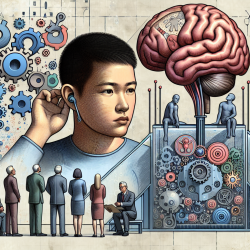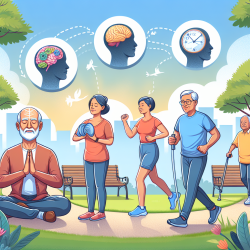Introduction
The COVID-19 pandemic has had profound effects on various aspects of life, particularly on the mental and social well-being of youth. A recent study titled "Perception of Iraqi youth towards social and psychological impact of COVID-19" provides valuable insights into these effects. This blog aims to help practitioners improve their skills by implementing the outcomes of this research and encouraging further exploration into the subject.
Understanding the Research
The study conducted in Iraq involved a sample of 762 young adults, primarily university students aged 18-24. The research revealed significant impairments in social leisure activities, private leisure activities, and the ability to form and maintain close relationships. Additionally, a considerable number of participants reported feelings of nervousness, anxiety, stress, and depression.
Key findings include:
- 40.4% of respondents reported severely impaired social leisure activities.
- 14.7% experienced severely impaired private leisure activities.
- 15.5% had severely impaired ability to form and maintain close relationships.
- 18% reported continuous feelings of nervousness, anxiety, or stress.
- 24.9% felt sad or depressed all the time.
Implications for Practitioners
For practitioners providing online therapy services, such as those at TinyEYE, these findings underscore the importance of addressing both social and psychological impacts in therapy sessions. Here are some strategies to consider:
- Enhance Social Skills Training: Focus on helping youth develop strategies to maintain and form relationships, even in a virtual environment. Encourage participation in online group activities to foster social interaction.
- Address Emotional Well-being: Incorporate techniques such as cognitive-behavioral therapy (CBT) to help manage anxiety and depression. Encourage mindfulness and stress-reduction practices.
- Adapt Therapy to Cultural Contexts: Be aware of cultural differences that may affect how youth perceive and cope with the pandemic's impact. Tailor therapy approaches to respect and incorporate these cultural nuances.
Encouraging Further Research
While this study provides valuable insights, further research is essential to understand the long-term effects of the pandemic on youth. Practitioners are encouraged to conduct longitudinal studies to track changes over time and to explore interventions that can mitigate negative impacts.
Additionally, expanding research to include diverse populations and settings will help develop more comprehensive and inclusive therapeutic strategies.
Conclusion
The COVID-19 pandemic has posed significant challenges to the mental and social well-being of youth. By leveraging research insights and adapting therapy practices, practitioners can better support youth in navigating these challenges. For more detailed insights, practitioners are encouraged to read the original research paper titled "Perception of Iraqi youth towards social and psychological impact of COVID-19".










